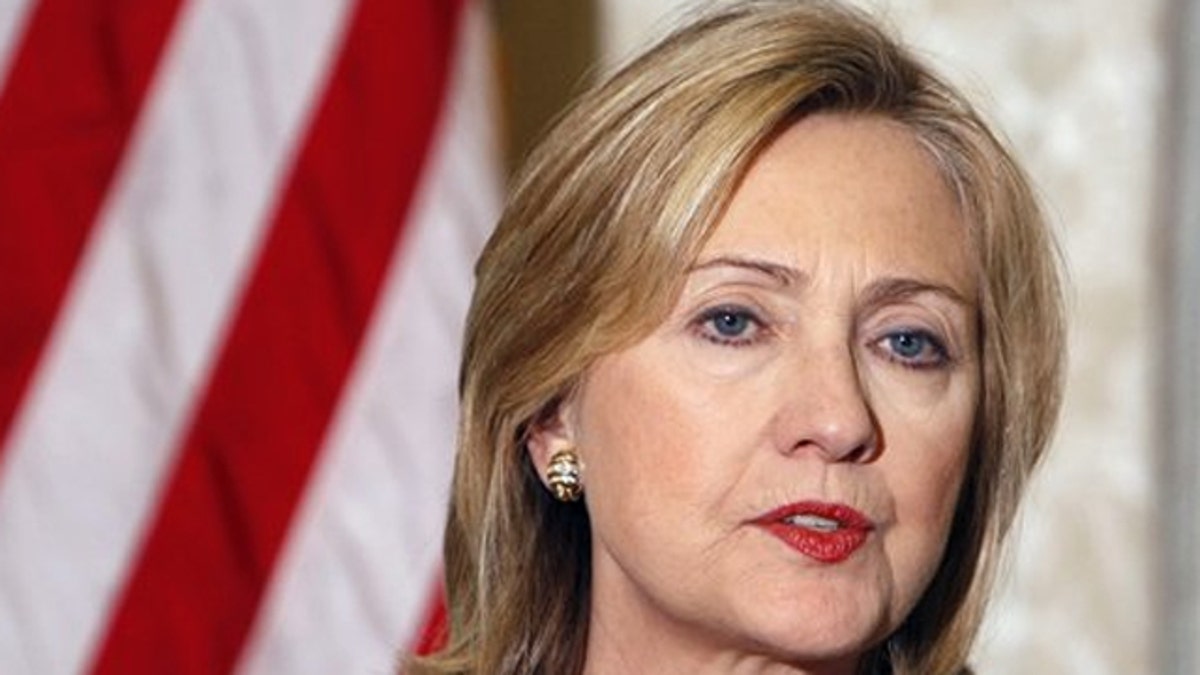
Secretary of State Hillary Clinton addresses reporters during a press conference at the U.S. embassy in Paris March 19. (AP)
The Obama administration is sending mixed messages about the direction, purpose and effect of the U.S.-led missile strikes on Libya, with conflicting statements from the top about leader Muammar al-Qaddafi's grip on power five days into the campaign.
The campaign may be in the midst of a key transition. A senior defense official told Fox News that missile strikes have essentially ended and that no more Tomahawk missiles are expected to be fired unless necessary. The next step is to hand control over to coalition commanders for patrol of the no-fly zone. But administration officials have not offered a clear picture as to what the no-fly zone is expected to yield.
Secretary of State Hillary Clinton said in an interview Tuesday that people in Qaddafi's inner circle have been "reaching out" to contacts in the region asking, "how do we get out of this?"
Clinton told ABC News that while some of it is "theater," some of it is "exploring," which the administration sees as a positive step.
"'What are my options? Where could I go? What could I do?' And we would encourage that," Clinton said.
But on the same day, President Obama said Qaddafi could just be digging in his heels.
"Qaddafi may try to hunker down and wait it out, even in the face of a no-fly zone, even though his forces have been degraded," Obama said in an interview with CNN en Espanol. The president reiterated that the coalition does not "have military tools at our disposal in terms of accomplishing Qaddafi's leaving," though he has said it is U.S. policy that Qaddafi should go.
In addition, Defense Secretary Robert Gates said Wednesday that, if there is interest in "mediation," it would be up to the Libyans to find a resolution to the conflict. But Clinton said Friday that the United States wants the "international community" involved in those discussions.
The muddled message continues to raise hackles on Capitol Hill, where lawmakers have slammed the administration for not seeking congressional approval before launching the strikes in support of the U.N.-approved no-fly zone. Lawmakers warn that Congress needs to have a full debate on the intervention, and that the United States needs to have a better handle on what U.S. forces are committing to by acting to defend rebel forces in Libya.
Though the Constitution vests Congress with the authority to declare war, White House officials reportedly told congressional aides from both parties Tuesday that the conflict does not count as a war. Aides told Politico that the briefing did not shed much light on the situation and did not provide a timetable.
"You learn more by having read the paper," one source told Politico.
Donald Rumsfeld, defense secretary under former President George W. Bush, speculated that Obama didn't first come to Congress precisely because of confusion over the mission.
"I suspect that one of the reasons that the administration didn't go to Congress is they didn't know what to ask for," Rumsfeld told Fox News on Tuesday. "They didn't know precisely with clarity and sufficient precision what it is they wanted the Congress to approve and the coalition clearly has not come to an agreement as to what their mission is."
Rumsfeld said that if the allies can't, as their primary goal, define the mission, then "you are doomed."
"The mission determines the coalition and the coalition not ought to determine the mission," Rumsfeld said. "I don't think they have agreed on a mission and the mission should have been decided before the coalition."
Obama administration officials say the mission is clear -- that they are engaged in a multilateral humanitarian intervention to stop Qaddafi from slaughtering his own people. Obama went a step further Tuesday, saying the intervention in Libya is also "in America's national interest."
Though the United States is at the helm now, Obama said the country "will not be in the lead" once the initial missile strikes are over and other forces step up to maintain the no-fly zone.
Obama, who is in El Salvador on the last leg of a Latin American trip, plans to cut his visit short Wednesday to return to Washington. He is spending the day at the American Embassy and is expected to participate in at least one conference call on Libya before returning.




